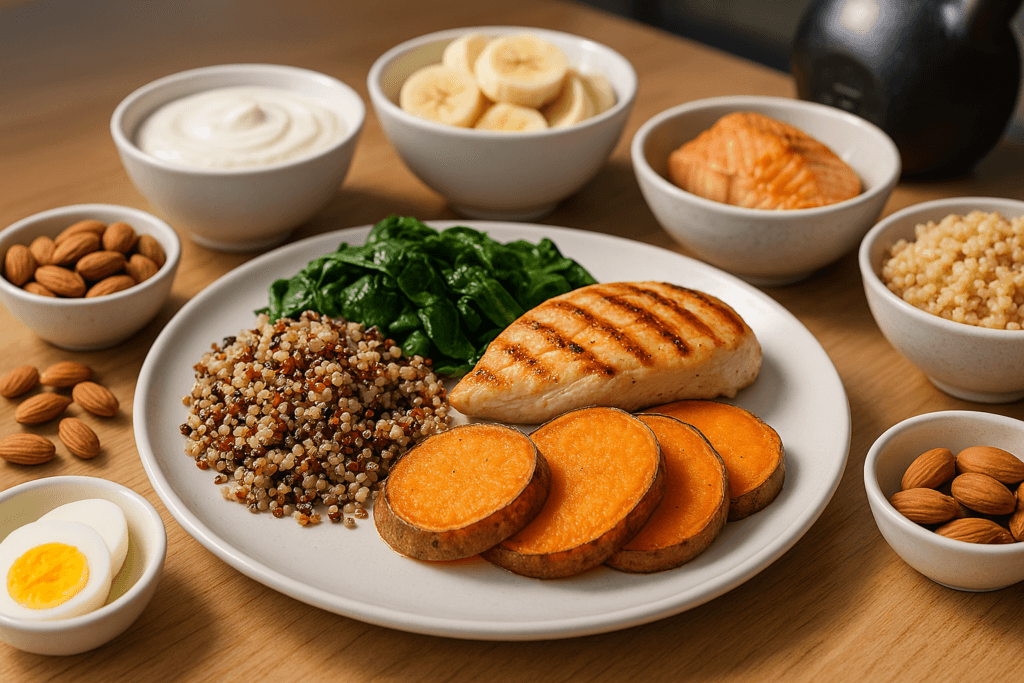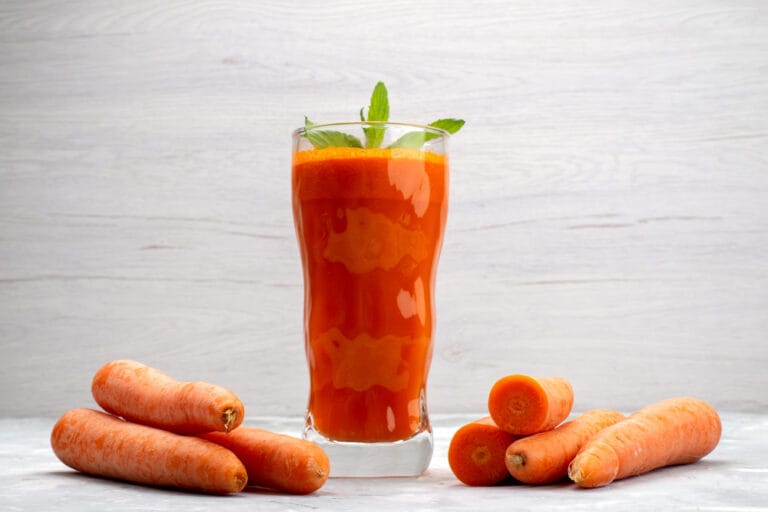FREE SHIPPING OVER $50
Eat These 10 Foods After an Intense Workout to Recover Like a Pro Athlete
When you finish an intense workout, your muscles are in a state of repair. Your body needs nutrients to rebuild damaged muscle fibers, replenish glycogen stores, and reduce inflammation. Skipping this crucial step can lead to prolonged muscle soreness, decreased performance, and even injury over time. Pro athletes understand that recovery isn’t just about rest—it’s about proper nutrition that targets muscle repair, energy restoration, and overall recovery.
Post-workout nutrition should focus on:
- Protein: Essential for repairing and building muscle tissue.
- Carbohydrates: Replenish the energy stores (glycogen) that are depleted during exercise.
- Healthy Fats: Assist with reducing inflammation and providing sustained energy.
- Micronutrients: Vitamins and minerals that support immune function and overall cellular repair.
The Science of Recovery: How Nutrients Help You Bounce Back

Recovery nutrition isn’t a one-size-fits-all solution, but it has some key components that help your body bounce back quickly. Here’s how each nutrient plays a role in recovery:
- Protein for Muscle Repair:
Protein provides the amino acids needed to rebuild and repair muscle fibers. Consuming a high-quality protein source after exercise helps reduce muscle breakdown and stimulates muscle protein synthesis. - Carbohydrates to Replenish Glycogen:
Intense workouts deplete glycogen stores in your muscles. Carbohydrates help restore these energy reserves, ensuring you have enough fuel for your next workout. Combining protein with carbs can also enhance recovery by promoting a better insulin response. - Healthy Fats for Inflammation Control:
Healthy fats, such as omega-3 fatty acids, have anti-inflammatory properties. They can help reduce exercise-induced inflammation and support joint health, which is critical after strenuous physical activity. - Vitamins and Minerals for Overall Recovery:
Micronutrients like vitamin C, vitamin E, magnesium, and potassium are essential for reducing oxidative stress and supporting muscle function. They help your body fight off free radicals and maintain cellular health during recovery.
10 Pro Athlete-Approved Foods for Post-Workout Recovery
1. Grilled Chicken Breast: High-Quality Protein Source
Grilled chicken breast is a lean protein that delivers essential amino acids needed for muscle repair and growth. It is low in fat and easily digestible, making it an ideal post-workout option.
2. Sweet Potatoes: Complex Carbohydrates for Glycogen Replenishment
Sweet potatoes provide complex carbohydrates that help restore glycogen levels in your muscles. They are also rich in vitamins A and C, which support immune function and reduce inflammation.
3. Quinoa: Complete Protein and Carbohydrate Combo
Quinoa is a complete protein containing all nine essential amino acids. It also offers a healthy dose of carbohydrates and fiber, making it perfect for muscle recovery and sustained energy release.
4. Greek Yogurt: Protein-Rich Dairy with Probiotics
Greek yogurt is an excellent source of protein and contains probiotics that aid in digestion. Its high protein content helps repair muscles, while its creamy texture makes it a delicious base for smoothies or snack bowls.
5. Spinach: Nutrient-Dense Greens for Micronutrient Boost
Spinach is packed with vitamins, minerals, and antioxidants like vitamin K, vitamin A, and magnesium. Including spinach in your post-workout meal supports muscle function and reduces oxidative stress.
6. Bananas: Quick Energy and Potassium
Bananas are a great source of natural sugars and potassium, which help replenish energy stores and prevent muscle cramps. They’re easy to digest and perfect for a quick post-workout snack.
7. Salmon: Omega-3 Fatty Acids for Inflammation Reduction
Salmon is rich in omega-3 fatty acids that help lower inflammation and promote heart health. It also provides high-quality protein that supports muscle recovery and overall body repair.
8. Brown Rice: Slow-Digesting Carbohydrates for Energy Sustenance
Brown rice offers slow-digesting carbohydrates that provide a steady release of energy. Its fiber content helps maintain stable blood sugar levels, ensuring you feel full and energized after your workout.
9. Eggs: Versatile Protein Powerhouse
Eggs are a versatile and complete protein source that contains essential amino acids, vitamins, and minerals. They are easy to prepare and can be incorporated into various dishes, making them a staple for muscle repair and recovery.
10. Almonds: Healthy Fats and Protein for Satiety
Almonds are packed with healthy fats, protein, and fiber, which help keep you satisfied and support muscle repair. They also offer vitamin E, an antioxidant that protects your cells from oxidative damage.
These 10 foods are more than just ingredients—they are recovery tools that work together to rebuild your body after an intense workout. Incorporate these into your meals to enhance recovery, reduce soreness, and fuel your performance.
How to Incorporate These Foods Into Your Routine
Integrating these post-workout foods into your daily routine is easier than you might think. The key is to plan ahead and combine these foods in creative and delicious ways that suit your taste and lifestyle. Here are some strategies to help you get started:
- Meal Prep and Planning:
Preparing meals in advance ensures that you always have nutrient-rich options available. Spend a few hours each week cooking and portioning out your protein, carbohydrates, and healthy fats. For example, grill chicken breasts, roast sweet potatoes, and cook a batch of brown rice that can be mixed into various dishes. - Smoothie Power:
Smoothies are a quick and convenient way to pack in multiple nutrients. Combine Greek yogurt, bananas, spinach, and a scoop of protein powder for a delicious recovery shake that replenishes glycogen and repairs muscles. - Balanced Plates:
When planning your post-workout meals, aim for a balanced plate that includes lean protein, complex carbohydrates, and healthy fats. For instance, pair a serving of grilled salmon with a side of quinoa and steamed spinach. This combination provides a complete nutritional profile to support recovery. - Snacking Smart:
Instead of reaching for processed snacks, keep nutrient-dense options like almonds or a hard-boiled egg on hand. These snacks are not only filling but also deliver a quick boost of protein and healthy fats when you need a post-workout pick-me-up. - Creative Cooking:
Explore different recipes that incorporate these foods in fun and innovative ways. Consider making a chicken and quinoa salad with a lemon-tahini dressing, or try a brown rice bowl topped with sautéed spinach, poached eggs, and a drizzle of olive oil. Experimenting in the kitchen can keep your recovery meals exciting and something to look forward to. - Timing Matters:
Aim to eat within 30-60 minutes after your workout. This window, often referred to as the “anabolic window,” is when your muscles are most receptive to nutrients, helping maximize recovery and muscle repair. Even if you can’t have a full meal, a small snack that combines protein and carbohydrates can make a significant difference.
Additional Recovery Tips and Lifestyle Habits
While the right foods play a huge role in recovery, other lifestyle habits are equally important. Here are some extra tips that can boost your post-workout recovery even further:
- Hydrate Consistently:
Drinking plenty of water throughout the day is crucial. After an intense workout, your body loses fluids through sweat, so replenishing with water or electrolyte-rich beverages can help maintain hydration, optimize muscle function, and prevent cramps. - Prioritize Sleep:
Quality sleep is when your body repairs and regenerates muscle tissue. Aim for 7-9 hours of restful sleep each night to support recovery, reduce stress, and improve overall performance. - Stretch and Cool Down:
Incorporate stretching and a proper cool-down routine after workouts. Gentle stretching can reduce muscle tightness, improve flexibility, and prevent injuries. Consider a 5-10 minute cool-down that includes static stretches targeting the major muscle groups you worked. - Monitor Your Progress:
Keeping a workout and nutrition journal can help you track how different foods and recovery strategies affect your performance. Record your meals, workouts, and how you feel during recovery. This insight will allow you to adjust your plan for optimal results. - Consider Supplementation When Necessary:
While whole foods should be your primary source of nutrients, supplements such as protein powders or electrolyte tablets can be beneficial when you’re short on time or need an extra boost post-workout. Always consult with a healthcare provider before adding supplements to your routine. - Stay Consistent:
Consistency is key to any recovery and performance plan. Regularly incorporating nutrient-rich foods and recovery practices into your routine will yield long-term benefits, helping you train harder and perform better over time.
By adopting these holistic lifestyle habits, you complement the benefits of your post-workout meals, creating an environment where your body can truly thrive.
Conclusion
When you plan your post-workout meals with these nutrient-dense options, you’re not only fueling your muscles but also setting the stage for future success. Proper recovery means reduced soreness, increased strength, and improved performance in your next workout session. By integrating these foods into your routine, you empower your body to repair, rebuild, and come back stronger.
Remember that nutrition is only one part of the equation. Hydration, sleep, stretching, and overall lifestyle habits all contribute to effective recovery.







